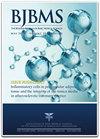抑制IRAK 1/4通过抑制TLR4/NF-κB通路和保护肠道屏障减轻结肠炎
IF 3.4
4区 医学
Q2 MEDICINE, RESEARCH & EXPERIMENTAL
引用次数: 5
摘要
白细胞介素-1受体相关激酶1/4(IRAK1/4)是toll样受体(TLR)介导的通路的主要激酶,被认为是治疗炎症性疾病的新靶点。研究表明,TLRs与溃疡性结肠炎的炎症反应之间存在显著相关性。因此,在本研究中,在用3%葡聚糖硫酸钠(DSS)诱导小鼠实验性结肠炎后,腹膜内给予不同浓度的IRAK1/4抑制剂。然后,通过HE染色评估疾病活动指数,包括病理损伤程度。随后,Western印迹检测TLR4/NF-κB通路和肠屏障蛋白表达(Zonula-1、Occludin、Claudin-1、JAM-A),实时聚合酶链式反应检测IRAK1/4和粘蛋白1/2的mRNA表达水平。此外,通过免疫荧光检测Zonula-1和occludin的表达水平,包括血浆FITC右旋糖酐4000浓度,以评估肠屏障通透性。然而,ELISA测定了炎症因子的表达,以反映小鼠的肠道炎症。研究表明,IRAK 1/4抑制剂显著减轻了小鼠的临床症状和病理性DSS诱导的结肠炎损伤,然后抑制了NF-κB p65的细胞质和细胞核易位,包括IκBα的磷酸化和下游炎症因子产生的减少。因此,我们确定IRAK1/4抑制剂有效改善DSS诱导的结肠炎,部分是通过抑制TLR4/NF-κB通路、减少炎症和维持结肠屏障的完整性。本文章由计算机程序翻译,如有差异,请以英文原文为准。
Inhibition of IRAK 1/4 alleviates colitis by inhibiting TLR 4/NF-κB pathway and protecting the intestinal barrier
Interleukin-1 receptor-associated kinase 1/4 (IRAK1/4) is the main kinase of the toll-like receptor (TLR)-mediated pathway, considered a new target for treating inflammatory diseases. Studies showed a significant correlation between TLRs and inflammatory responses in ulcerative colitis. Therefore, in this study, after inducing experimental colitis in mice with 3% dextran sulfate sodium (DSS), different concentrations of IRAK1/4 inhibitors were administered intraperitoneally. Then, the disease activity index was assessed, including the degree of pathological damage, by HE staining. Subsequently, while Western blotting detected the TLR4/NF-κB pathway and intestinal barrier protein expression (Zonula-1, Occludin, Claudin-1, JAM-A), real-time polymerase chain reaction detected the mRNA expression levels of IRAK1/4 and mucin1/2. Furthermore, the expression levels of Zonula-1 and occludin were detected by immunofluorescence, including the plasma FITC-dextran 4000 concentration, to evaluate intestinal barrier permeability. However, ELISA measured the expression of inflammatory factors to reflect intestinal inflammation in mice. Investigations showed that the IRAK 1/4 inhibitor significantly reduced clinical symptoms and pathological DSS-induced colitis damage in mice and then inhibited the cytoplasmic and nuclear translocation of NF-κB p65, including the phosphorylation of IκBα and reduction in downstream inflammatory factor production. Therefore, we established that the IRAK1/4 inhibitor effectively improves colitis induced by DSS, partly by inhibiting the TLR4/NF-κB pathway, reducing inflammation, and maintaining the integrity of the colonic barrier.
求助全文
通过发布文献求助,成功后即可免费获取论文全文。
去求助
来源期刊

Bosnian journal of basic medical sciences
医学-医学:研究与实验
CiteScore
7.40
自引率
5.90%
发文量
98
审稿时长
35 days
期刊介绍:
The Bosnian Journal of Basic Medical Sciences (BJBMS) is an international, English-language, peer reviewed journal, publishing original articles from different disciplines of basic medical sciences. BJBMS welcomes original research and comprehensive reviews as well as short research communications in the field of biochemistry, genetics, immunology, microbiology, pathology, pharmacology, pharmaceutical sciences and physiology.
 求助内容:
求助内容: 应助结果提醒方式:
应助结果提醒方式:


